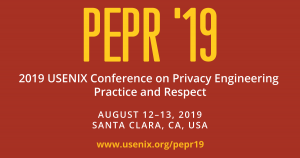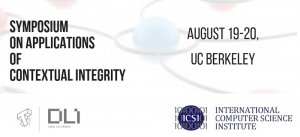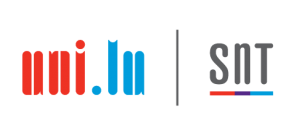Home
Use our global calendar of privacy events to locate an event near you.
FILTER BY

The USENIX Conference on Privacy Engineering Practice and Respect (PEPR) is a single-track conference focused on designing and building products and systems with privacy and respect for their users and the societies in which they operate. Our goal is to improve the state of the art and practice of building for privacy and respect and to foster a deeply knowledgeable community of both privacy practitioners and researchers who collaborate towards that goal.

For August, we’re thrilled that NIST will join us to share an updated draft of their Privacy Framework to seek feedback prior to its planned October 2019 release.
Join us at 6pm for networking. Program starts at 6:30pm.
Presenters include:
- Naomi Lefkovitz, Senior Privacy Policy Advisor and Lead, Privacy Framework, NIST
- Ellen Nadeau, Deputy Manager, Privacy Framework, NIST

The aim of the symposium is to foster interaction among diverse communities of research and practice using contextual integrity to reason about privacy, and to design and evaluate, craft regulation, and generate formal logics for privacy.
As the goal of the workshop is to foster discussion around works in progress, the workshop will not publish formal proceedings (so as to not preclude the publication of subsequent versions of those works, improved by workshop feedback). However, with authors’ permission, we will post accepted submissions on the website.
The year 2019 may be a turning point for data privacy law. Privacy law in the United States is famously a hole-ridden patchwork of state laws, sectoral legislation, and consumer protection. Whether in response to the European Union’s General Data Protection Regulation or to California’s enactment of its Consumer Privacy Act, over this past year state and federal legislators have been proposing new data privacy laws at an energetic rate.
How will we govern the technology of the near future? Will the United States join the rest of the world in recognizing data privacy rights or will it take its own approach? Will these choices even matter in practice, given the long reach of both EU and California law?
This conference will bring together academics, practitioners, technologists, and regulators to discuss the near future of U.S. data privacy law. Specifically, we will explore municipal bans on surveillance technology, new state privacy laws, the future role of the Federal Trade Commission, and proposed federal legislation.
Those who cannot attend the event in person may also register for the free livestream.

OASIS and University of Oxford will host a unique, two-day international workshop to bring together software engineers, policy makers, lawyers, practitioners, technologists and independent data protection/privacy experts from industry, standards communities, regulators, government, and academia to share lessons learnt about data protection, discuss how to address challenges in today’s society from a multistakeholder perspective.
In this workshop, we hope to bring together new insights on the state of the art in real-time data protection service delivery, by identifying clear gaps common across various stakeholders that need to be filled, and promising industry and research initia-tives attempting to build solutions to hard problems.
Call for Presentations due June 14th, 2019
https://privacyworkshop19.oasis-open.org/en/71-call-for-presentations
Call for posters due August 19th, 2019
https://privacyworkshop19.oasis-open.org/en/86-call-for-posters

Recent congressional hearings and data breaches have prompted legislators, advocacy groups, and business leaders to call for broad federal privacy legislation. Furthermore, congressional leaders in both parties have expressed an interest in taking up privacy legislation and various Members of Congress have released drafts of bills intended to spark discussion. As Congress returns to session in September, legislators will face continuing questions about how to develop federal legislation to protect personal information.
On September 11, the Center for Technology Innovation at Brookings will host a public discussion on the status of federal privacy legislation. This event, part of Brookings’ ongoing focus on the privacy debate, will examine expected legislation through the eyes of keynote speakers and two expert panels. The first panel, which will be a live taping of the Lawfare Podcast, will look through the broad lens of competing visions of what legislation should accomplish and the impact on businesses and individuals. The second panel will delve into specific issues presented by proposals for legislation, the path forward to passage, and the prospects.
Following the discussion, each panel will take questions from the audience.

As Congress currently works toward a national data privacy law, how will existing and emerging innovations be impacted, including connected devices, applications, and the cloud? What will be the effects of stronger transparency and disclosure requirements on consumer-facing technologies and companies? What will privacy compliance look like for companies who offer online or cloud-based products and services? How can we protect consumer rights in the emerging world of around-the-clock digital connections?
On September 16, the Center for Technology Innovation at Brookings will host a public discussion on how federal legislation should account for a variety of nuanced verticals, including health care, commerce, and education. Panelists will discuss how pending legislation should allow for innovation, while still ensuring greater consumer transparency. The event will also examine the context and application of any new data law and its effect on various online, behavioral activities managed by consumers.
Following the discussion, the panel will take questions from the audience.

The aim of the conference is to explore the practical implementation of EU data protection rules within the law enforcement sector and highlight some of the practical challenges that data protection experts face in light of developments in policing, society as a whole and a rapidly changing criminal environment.
The conference is organised by the Danish National Police and ERA in cooperation with Europol’s Data Protection Experts Network (EDEN) and will bring together internationally renowned practitioners from law enforcement and security authorities with privacy experts, academics and civil society representatives.
Key topics
- Data-sharing, GDPR and the police: how to fight crime in the age of GDPR?
- Passenger Name Record (PNR) data
- “Data protection by design” through legislation?
- Policing in the age of artificial intelligence (AI), open source intelligence (OSINT) and the Internet of Things: proportionality in an age of data abundance
Who should attend?
Law enforcement officials, data protection officers, members of Europol’s Data Protection Experts Network (EDEN), representatives of national data protection authorities, academics.
 Certification Training September 22-23
Certification Training September 22-23
Workshops September 23
Conference September 24-25
Las Vegas

About the Workshop
Over the past decades, a multitude of security and privacy enhancing technologies has been developed and brought to considerable maturity. However, the design and engineering of such technologies often ignores the organizational context that respective technologies are to be applied in. This workshop aims to bring together engineering and organizational/behavioral scientists active in the field of security and privacy in order to facilitate a better match between those – so far – largely disconnected perspectives. It’s explicit goal is to pave the way for technical security and privacy mechanisms and systems that match organizational needs and givens better than current ones.
Call for Papers
Over the past decades, a multitude of security and privacy enhancing technologies has been developed and brought to considerable maturity. However, the design and engineering of such technologies often ignores the organizational context that respective technologies are to be applied in. A large and hierarchical organization, for example, calls for significantly different security and privacy practices and respective technologies than an agile, small startup. Similarly, whenever employees’ behavior plays a significant role for the ultimate level of security and privacy provided, their individual interests and incentives as well as typical behavioral patterns must be taken into account and materialized in concrete technical solutions and practices. Even though research on security- and privacy-related technologies increasingly takes into account questions of practical applicability in realistic scenarios, respective approaches are typically still rooted in the technical domain alone, motivated by technical givens and constraints from the practice.
On the other hand, a substantial body of organization-related security and privacy research already exists, incorporating aspects like decision and governance structures, individual interests and incentives of employees, organizational roles and procedures, organizational as well as national culture, or business models and organizational goals. Nonetheless, these research activities are only seldomly translated into concrete technical mechanisms, frameworks, and systems.
This disconnection between rather technical and rather organization-related security and privacy research leaves substantial room for improving the fit between concrete technologies on the one and organizational practices on the other hand. Achieving a better fit between these two sides through security and privacy technologies that soundly incorporate organizational and behavioral theories and practices promises substantial benefits for organizations and data subjects, engineers, policy makers, and society as a whole.
The aim of this workshop is therefore to discuss, exchange, and develop ideas and questions regarding the design and engineering of technical security and privacy mechanisms with particular reference to organizational contexts. We invite papers from researchers and practitioners working in security- and privacy-related systems engineering as well as in the field of organizational science to submit their original papers to this workshop. Topics of interest include, but are not limited to:
- Security and privacy technologies consciously addressing different organizational structures
- Security and privacy technologies and individual behavior
- Security and privacy technologies and organizational / national cultures
- Security and privacy technologies for and in unusual organizational settings
- Engineering methods, frameworks, and assessment approaches for addressing the above subjects in novel ways
We particularly welcome papers explicitly translating findings and insights from organizational and behavioral theory into the concrete design and engineering of technical security and privacy mechanisms as well as papers evaluating, assessing, or scrutinizing existing security and privacy technologies against actual organizational and behavioral theories and/or givens from the practice. Papers without relation to concrete technologies are, however, not excluded in general.
Types of Papers
Besides regular (max. 16 pages) and short (max. 8 pages) papers, we also invite practical demonstrations, intermediate reports, and mini-tutorials on respective technologies currently under development. Such contributions should be consciously tailored to inspire more in-depth discussions. Submissions falling under this category should describe the proposed contribution to the workshop in no more than 4 pages and be explicitly marked as such during the submission process.
Accepted papers will be published in a joint LNCS proceedings together with two other ESORICS workshops. Additional publication opportunities for extended papers in a special issue of an Open Access Journal are discussed.
Authors of accepted papers must guarantee that their papers will be presented at the workshop. At least one author must register.
Submissions
Submissions must be done via EasyChair at https://easychair.org/conferences/?conf=spose2019 (see also https://easychair.org/cfp/SPOSE2019). Submissions must be formatted according to the LNCS-Template.
Important dates (might be subject to change, depending on publication constraints)
- Submission deadline:
June 14, 2019extended to June 28, 2019 (23:59 CEST) - Review deadline: July 19, 2019
- Notification to authors: July 26, 2019
- Camera-ready versions: August 16, 2019
- Workshop: September 26 or 27, 2019
